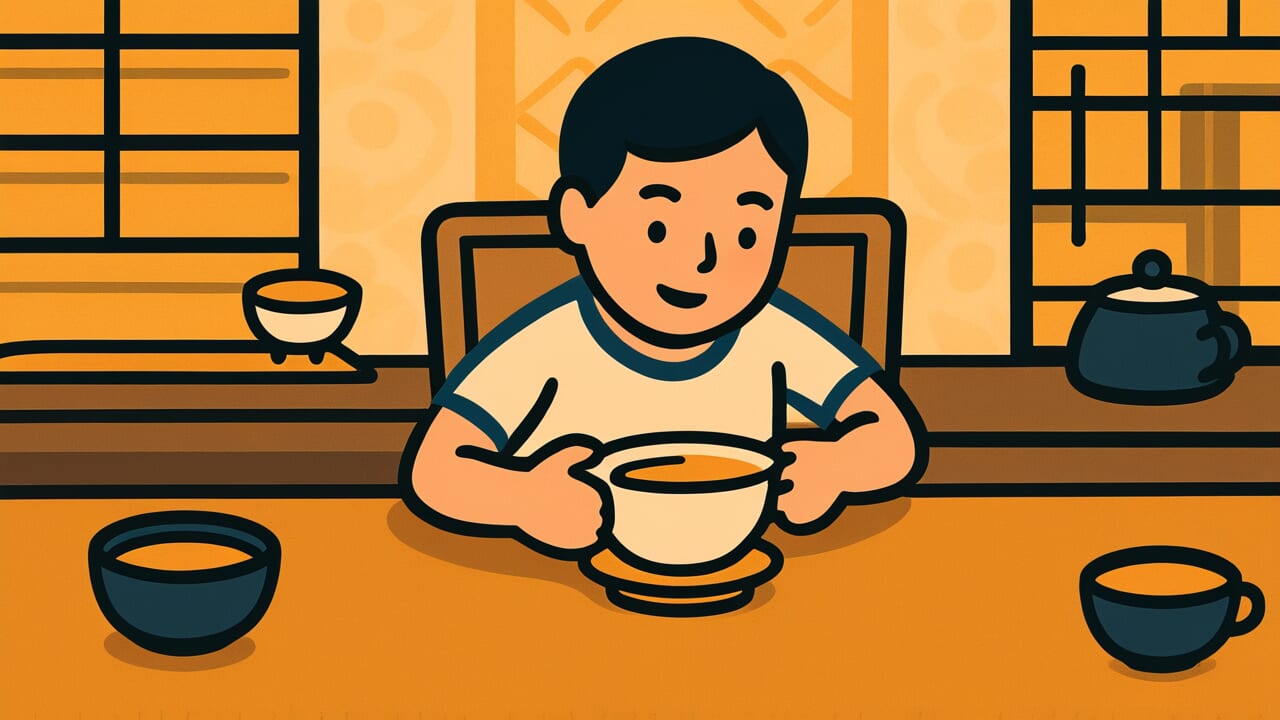How to Read “Tea over rice before breakfast”
Asameshi mae no ochazuke
Meaning of “Tea over rice before breakfast”
“Tea over rice before breakfast” is a metaphor for something extremely easy to do. It emphasizes simplicity by combining two ideas: something so easy you could do it before breakfast, plus ochazuke, the simplest meal possible.
This proverb describes tasks or challenges that require no special preparation or effort. It refers to things you can do naturally based on your abilities and experience.
Even today, when someone asks you to do work in your specialty or a familiar task, you might say “That’s like tea over rice before breakfast.” This shows you can handle it with complete confidence.
However, in Japanese culture where humility matters, people rarely say this out loud.
Origin and Etymology
No clear written record exists showing when this proverb first appeared. However, we can make interesting observations about how the phrase is constructed.
The expression “asameshi mae” (before breakfast) has been used since the Edo period. It referred to things so easy you could do them before eating breakfast, when you’re still hungry.
Morning is the start of the day, before serious activities begin. If something is easy even before breakfast, it must be extremely simple.
What makes this proverb interesting is the addition of “ochazuke.” Ochazuke is one of the simplest dishes in Japanese cuisine – just tea poured over rice.
It requires almost no cooking effort. People can quickly eat it when busy or tired. This dish has deep roots in everyday Japanese life.
The proverb doubles down on simplicity. It takes “before breakfast,” which already means easy, and adds “ochazuke,” a symbol of effortlessness.
This creates a double emphasis on how simple something is. The combination shows a very Japanese sense of humor and wordplay.
Usage Examples
- This level of programming assignment is like tea over rice before breakfast for me, so I’ll finish it by noon
- For her, giving an English presentation is like tea over rice before breakfast, so don’t worry
Universal Wisdom
“Tea over rice before breakfast” contains wisdom about confidence in our strengths and the delicate psychology of expressing that confidence.
Through years of experience and training, everyone becomes better at certain things than others. But when we try to express this, we face a strange conflict.
We want to confidently say “this is easy,” yet we don’t want to appear arrogant. We struggle between confidence and humility.
What’s interesting about this proverb is how it uses double emphasis to shift into humor. “Before breakfast” alone would be enough, but adding “ochazuke” makes it slightly exaggerated and amusing.
This might be a wisdom Japanese people developed to balance confidence and humility.
Everyone wants their abilities recognized. At the same time, everyone feels resistance to openly claiming their skills.
This proverb wraps this complex human psychology in playful wordplay. By including humor in the expression of confidence, it avoids creating friction.
This represents timeless wisdom about human relationships.
When AI Hears This
When I process this expression, something interesting happens. Even though database searches find no certain source, the combination of the real proverb “asameshi mae” and the Japanese element “ochazuke” feels strangely plausible.
This directly reflects characteristics of the human brain’s pattern recognition system.
According to research by cognitive psychologist Roediger and colleagues, humans mistakenly recognize false information combining known elements as “seen before” about 40 percent of the time.
When the real proverb “asameshi mae” connects with “ochazuke,” a symbol of Japanese culture, the brain automatically detects “proverb-like qualities.”
In other words, our cognitive system prioritizes efficiency over completeness. It skips detailed verification and judges “if it seems right, it’s OK.”
Even more troublesome is the metacognitive paradox. The ability to question “is this really a proverb?” itself creates the illusion that “if it’s complex enough to doubt, maybe it’s real.”
When we recognize low certainty, we paradoxically think “maybe it exists and I just don’t know it.” This double trap becomes a powerful mechanism that makes created expressions seem authentic.
Lessons for Today
This proverb teaches modern people the importance of correctly recognizing what we’re good at.
In modern society, humility is considered a virtue. Because of this, many people underestimate their own abilities.
However, identifying what’s like “tea over rice before breakfast” for you is an important skill for living efficiently.
What’s easy for you might not be easy for others. It’s wasteful to take for granted abilities you’ve built through years of experience and effort.
By correctly understanding your strengths and finding situations to use them, you can create greater value.
At the same time, this proverb promotes understanding of others. What’s like “tea over rice before breakfast” for someone else might be difficult for you. The reverse is also true.
By recognizing and supporting each other’s strengths, we can build richer relationships.



Comments